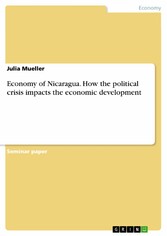Economy of Nicaragua. How the political crisis impacts the economic development
von: Julia Mueller
GRIN Verlag , 2021
ISBN: 9783346357205
, 18 Seiten
Format: PDF
Kopierschutz: frei
Preis: 15,99 EUR
eBook anfordern 
Mehr zum Inhalt

Economy of Nicaragua. How the political crisis impacts the economic development
Seminar paper from the year 2019 in the subject Business economics - Economic Policy, grade: 2, University of Vigo, language: English, abstract: This essay will examine how the political crisis impacts on the economic development by analysing some of the characteristic numbers of the Nicaraguan economy. First it will explain poverty and inequality which are one of the main problems in the country. Then, it will focus on economic growth and the importance of the tourism sector. After that it will take a short look at Nicaragua's performance in the GCI. Earlier this year Nicaragua was named 'The other Venezuela of Latin America' by the economic newspaper Portafolio due to its economic crisis which is the worse of the last thirty years caused by socio-political and humanitarian conflicts. Although Nicaragua is considered one the poorest country in Latin America it had one of the fastest-growing economies. Since April 2018, Nicaragua has been in a severe crisis. After the violent suppression of pro-tests against a social security reform, 325 people died, more than 2000 were injured and about 800 people were arrested. Furthermore, around 70.000 people left the country - most of them are fleeing south for Costa Rica. International human rights organizations accuse the state of systematic and serious human rights violations. The government rejects the accusations and accuses its opponents of a political campaign. According to its constitution, Nicaragua is a presidential democracy with a one-chamber parliament. Daniel Ortega has been president since 2007. After the Sandinista revolution against the dictator Anastasio Somoza in 1979, he ruled the country authoritarian for eleven years with a social reform agenda. Government, administration, judiciary and the ruling party Frente Sandinista de Liberación Nacional (FSLN) are closely intertwined. The 2016 elections took place without international election observation. The international community is engaged in various ways to reform the electoral system and fully restore the rule of law and civil liberties.













